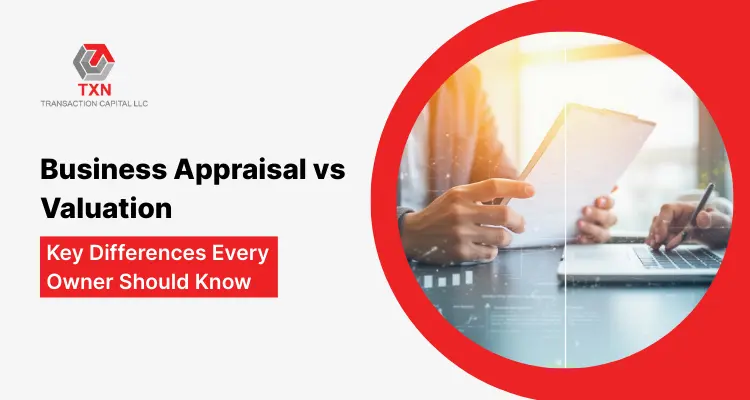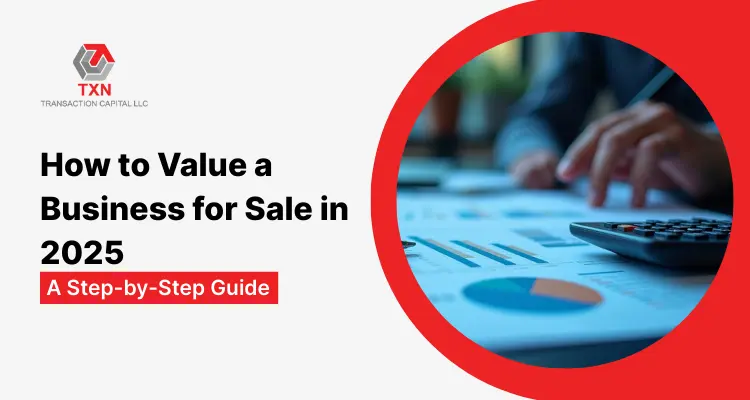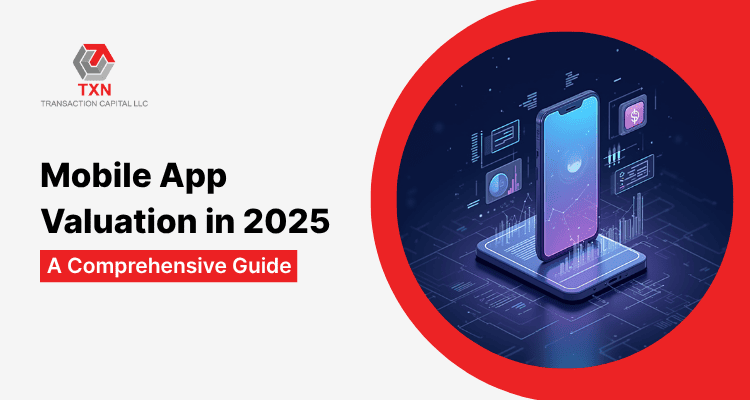The Best Business Valuation Guide 2025: DCF, Relative Valuation, SOTP & Holding Company Methods Explained

In today’s volatile economic environment, understanding a company’s true value has never been more important. Whether you’re a startup founder distributing stock options, a corporate CFO planning strategic exits, or a private equity investor analyzing an acquisition, accurate business valuation is crucial for making informed decisions.
Business valuation goes beyond mere equations or balance-sheet totals. It incorporates financial analysis, economic conditions, market sentiment, and a company’s unique characteristics. It requires the application of various approaches, each offering its own perspective. At Transaction Capital LLC, we believe that every company has a narrative that deserves proper valuation.
What Determines a Company’s or Business Value?
Several internal and external factors influence a company’s valuation, such as:
- Purpose of Valuation: Valuation objectives include fundraising, 409A compliance, litigation, M&A, and financial reporting.
- Business stage: early-stage startup, scaling business, or mature organization
- Financial health: revenue model, profitability, capital structure, and liabilities
- Intangible Drivers: Intangible drivers include brand equity, IP portfolio, leadership quality, and customer loyalty.
- Industry and Macro Trends: Industry and macro trends include regulatory changes, competitive intensity, and economic cycles.
Before choosing a valuation approach, it is important to define:
- Standard of Value: Value standards include fair market value (FMV), investment value, and liquidation value.
- Premise of Value: Value propositions include going concern, orderly liquidation, forced sale, and more.
Key Takeaway: Price is what you pay. Value refers to how much something is worth to you. Valuation is contextual.
Before deciding on a valuation approach, it is necessary to define:
- Standard of Value: Value criteria encompass fair market value (FMV), investment value, and liquidation value.
- Premise of Value: Value propositions include going concern, orderly liquidation, forced sale, and others.
Key Takeaway: You get what you pay for. Value expresses how much something is valuable to you. Valuation is contextual.
Core Components of a DCF Model
Free Cash Flow (FCF) Forecasting
FCF = EBIT − Taxes + Depreciation − Capital Expenditure − Change in Working Capital
Forecasts typically span 5 to 10 years and are based on:
- Revenue projections by segment
- Gross margin stability and SG&A trends
- CapEx requirements and reinvestment strategy
Terminal Value Calculation
Terminal Value captures all cash flows beyond the forecast horizon. Two common methods:
- Gordon Growth Model: Assumes perpetual growth at a steady rate
- Exit Multiple Method: Applies EV/EBITDA or EV/Revenue multiples based on market comps
Discount Rate – WACC (Weighted Average Cost of Capital)
WACC reflects the business’s capital structure and risk profile:
- Cost of Equity: Derived using CAPM (includes Risk-Free Rate, Beta, Market Premium, CSRP)
- Cost of Debt: Adjusted for effective tax rate
- Adjustments for small business premiums, illiquidity, and country risk
Present Value Calculation
Discounted cash flows and terminal value are summed to calculate:
- Enterprise Value (EV) = PV of FCFs + Terminal Value
- Equity Value = EV − Net Debt + Excess Cash
Common Challenges in DCF Valuation
At Transaction Capital LLC, we approach DCF issues by:
- Modelled scenarios using PWERM (Probability Weighted Expected Return Method).
- Utilised Duff & Phelps and Ibbotson data for accurate WACC calculations.
- Developed tailored terminal value methodologies for tech, SaaS, and cyclical businesses.
- Documented all assumptions and inputs for audit purposes.
- Utilised valuation waterfall modelling to manage capital stack complexity.
Relative valuation: quick, market-driven, benchmark-based.
Relative valuation, often known as the market technique, compares your business to similar public or private enterprises by utilising valuation multiples. This strategy addresses the question, “How are similar businesses or companies valued in today’s market?”.
Key Multiples Used:
- EV/EBITDA is a popular metric in M&A and PE transactions.
- P/E Ratio is common for mature, profitable enterprises.
- EV/Revenue: Ideal for early-stage and SaaS firms.
- Price-to-Book (P/BV) is important for financial institutions and asset-heavy businesses.
Why use relative valuation?
- Effective communication and market relevance.
- Faster than DCF and does not require long-term estimates.
- Ideal for fundraising, IPOs, M&A benchmarking, and 409A support.
The limitations of relative valuation
- Depends on proper peer group selection
- Combines risk, growth, and capital structure into a single metric
- Peer companies may differ in stage or accounting norms, perhaps leading to misinformation.
How TXN Capital Improves Relative Valuation
- Intelligent Peer Selection.
We utilise filters other than SIC/NAICS codes to match:
- Customer segments and pricing strategies
- Capital intensity and growth trajectory
- Geographic and regulatory exposure.
- Forward Multiples for Future Projections
Especially important for SaaS and IT companies. Instead of historical data, we utilise EV/EBITDA multiples for 2025-2027.
- Valuation adjustments
- Normalise one-time costs and gains.
- Adjust for non-operating assets (e.g., surplus cash)
- include intangibles such as intellectual property, technology stack, and brand equity.
- Global Comps with Regional Adjustments
When local peers are unavailable, we adjust global comps for:
-
- Currency fluctuations
- Country-specific tax regimes
- Inflation and capital market maturity
- Certified Standard
Reports comply with:
- ABV® (AICPA)
- ASA® (American Society of Appraisers)
- CVA® (NACVA)
- IRS 409A, ASC 718, IVS, USPAP
Sum of the Parts (SOTP) Valuation
SOTP valuation is best suited for diverse organisations with several divisions, subsidiaries, or investment interests. It assigns independent values to each segment and aggregates them.
Use cases:
- Conglomerates have unrelated business lines.
- PE portfolios or SPVs with numerous assets
- Companies with both active and passive investing
How it works
- Value each division individually using DCF or market multiples.
- Sum all component values.
- Provide a diversity discount (10-30%) for:
- Issues include a lack of cohesion,
- Increased management expense
- Decreased transparency.
Holding Company Valuation
Holding corporations frequently report little to no operating income.
Their value is derived from the underlying assets.
- Listed equity positions valued at the current market price or DCF.
- Private equity holdings (DCF or Relative Value with Discounts)
- Real estate, intellectual property, and alternative investments.
Key considerations:
- Limited control (minority holdings)
- Illiquidity discounts for unlisted investments
- Tax implications for asset disposal
TXN Capital uses a bottom-up approach, evaluating each asset and making the required control and liquidity modifications.
Final Thoughts: Why Transaction Capital LLC stands apart
Transaction Capital LLC provides more than simply valuation studies; we also provide strategic clarity. Our clients include venture-funded startups, global corporations, family offices, and institutional investors.
Reasons Clients Trust Us
- Over 1,500 completed valuations in SaaS, fintech, healthcare, manufacturing, and blockchain sectors.
- Certified experts with ABV®, ASA®, CVA®, and MRICS® certifications.
- Reports approved by IRS and auditors include 409A Safe Harbour, ASC 718, and IVS compliance.
- Our fixed pricing starts at $500 with 4-5 business day delivery.
- Our services go beyond compliance, highlighting value drivers, operational inefficiencies, and capital optimisation methods.
Contact Us Today
- Phone +1 (917) 809-4838
- Email: info@txncapitalllc.com
- Website: txncapitalllc.com
- Telegram: saurobhbarick



